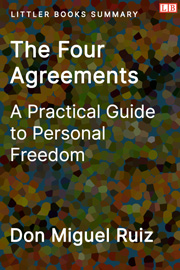Book Description
A transformative guide to achieving personal freedom and happiness through powerful principles of self-awareness, authenticity, and positivity.
If You Just Remember One Thing
Coming soon.
Bullet Point Summary and Quotes
- The Toltec culture, a Mesoamerican culture which emphasized education and knowledge, has teachings that can help us achieve more fulfilling lives. The ideas in this book are inspired by the Toltec people.
- Our dreams and behaviors are shaped by our environment. Since birth, society punishes us for disobeying its rules and rewards us for following them. We strip our individuality and domesticate ourselves by adhering to the desires of the collective. It happens to all of us, but we can obtain more agency and happiness by instituting The Four Agreements.
- The first agreement: Be impeccable with your words. Words transform the way we think. They shape our reality and opinions. Do not say untrue negative things to ourselves or to others.
- For example, a tired and irritable mother comes home from a hard day at work. Her daughter sings loudly. The mother says, “Please stop singing. It's annoying.” These words can stay with the daughter for a long time and hurt her self-esteem.
- The second agreement: Do not take things personally. When you do, you are in a state of personal importance and believe that everything is about you.
- What people say or do reflect them, not you. People are more likely to insult you when they feel bad, and praise you when they feel good.
- Take the time to truly know yourself, so judgements from others won't affect you, because you'd know they're untrue.
- It is far more productive to seek acceptance from yourself than from others.
- The third agreement: Ask questions, do not make assumptions (about others or about yourself). Most assumptions are not based on reality but imagination.
- If someone ignored your greeting, you might assume you have wronged them, when in reality it's mostly for another reason. They might be upset about something else, or simply didn't hear you.
- Assumptions hurt relationships. Asking questions (e.g., “I noticed XYZ. What's going on?”) and communicating clearly is key.
- The fourth agreement: Always do your best. If you don't, you're susceptible to self-criticism and guilt.
- Be aware that your “best” always changes with context. For example, your best in the morning might be different from your best at night. Keep this in mind to avoid burning out.
- Do your best in the things that make you happy. If you're only working for a paycheck, your job will feel difficult and joyless. If you work on something you love, it will feel effortless and satisfying.
- To start living by The Four Agreements, we first need to break our old agreements. There are three ways to do so.
- First, we need to become aware of our dream of the first attention, which refers to our selfs that were constructed by others during childhood, and recognize our fear-based beliefs that cause us unhappiness. Then we can change our beliefs and dreams to create the dream of the second attention.
- Second, according to Toltec teachings, there's a parasite in our minds that breeds negativity and unhappiness. The way to starve the parasite is forgiveness. Practice forgiveness of others and yourself.
- Third, live each day as if it's your last. This is also called initiation of the dead. Everything only exists in the present. Ask yourself, “Do I really want to spend this precious moment worrying about what other people think?”
The Four Agreements: Resources
- Download this summary and 173+ other top nonfiction book summaries in one book (PDF, eBook, DOCX)
- Buy the book
